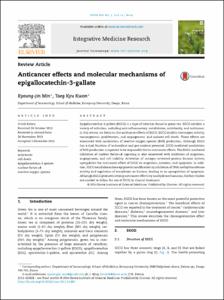Anticancer effects and molecular mechanisms of epigallocatechin-3-gallate
- Keimyung Author(s)
- Kwon, Taeg Kyu
- Department
- Dept. of Immunology (면역학)
- Journal Title
- Integrative Medicine Research
- Issued Date
- 2014
- Volume
- 3
- Issue
- 1
- Abstract
- tEpigallocatechin-3-gallate (EGCG) is a type of catechin found in green tea. EGCG exhibits avariety of activities, including anti-inflammatory, antidiabetes, antiobesity, and antitumor.In this review, we focus on the antitumor effects of EGCG. EGCG inhibits carcinogen activity,tumorigenesis, proliferation, and angiogenesis, and induces cell death. These effects areassociated with modulation of reactive oxygen species (ROS) production. Although EGCGhas a dual function of antioxidant and pro-oxidant potential, EGCG-mediated modulationof ROS production is reported to be responsible for its anticancer effects. The EGCG-mediatedinhibition of nuclear factor- B signaling is also associated with inhibition of migration,angiogenesis, and cell viability. Activation of mitogen-activated protein kinases activityupregulates the anticancer effect of EGCG on migration, invasion, and apoptosis. In addi-tion, EGCG could also induce epigenetic modification by inhibition of DNA methyltransferaseactivity and regulation of acetylation on histone, leading to an upregulation of apoptosis.Although EGCG promotes strong anticancer effects by multiple mechanisms, further studiesare needed to define the use of EGCG in clinical treatment.
- Keimyung Author(s)(Kor)
- 권택규
- Publisher
- School of Medicine
- Citation
- Kyoung-jin Min and Taeg Kyu Kwon. (2014). Anticancer effects and molecular mechanisms of
epigallocatechin-3-gallate. Integrative Medicine Research, 3(1), 16–24. doi: 10.1016/j.imr.2013.12.001
- Type
- Article
- ISSN
- 2213-4220
- Appears in Collections:
- 1. School of Medicine (의과대학) > Dept. of Immunology (면역학)
- 파일 목록
-
-
Download
 oak-aaa-02187.pdf
기타 데이터 / 1.68 MB / Adobe PDF
oak-aaa-02187.pdf
기타 데이터 / 1.68 MB / Adobe PDF
-
Items in Repository are protected by copyright, with all rights reserved, unless otherwise indicated.